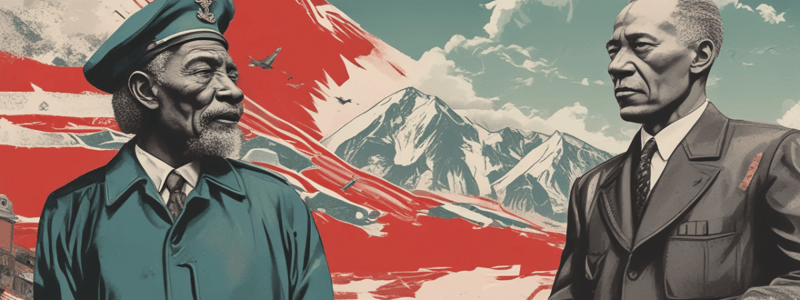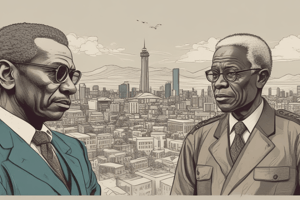Podcast
Questions and Answers
What event in 1991 had significant ramifications for South Africa's internal political dynamics?
What event in 1991 had significant ramifications for South Africa's internal political dynamics?
- The election of Nelson Mandela
- The end of apartheid
- The start of the Cold War
- The collapse of the Soviet Union (correct)
Why did the Western countries support the National Party during the Cold War?
Why did the Western countries support the National Party during the Cold War?
- To stop the apartheid regime
- To counter the spread of communism in Africa (correct)
- To spread communism in Africa
- To promote democracy in South Africa
What was the term used by the National Party to describe the communist threat?
What was the term used by the National Party to describe the communist threat?
- The Communist Threat
- The Rooi Gevaar (correct)
- The Red Menace
- The Black Danger
What happened to the National Party's strategic value after the collapse of the Soviet Union?
What happened to the National Party's strategic value after the collapse of the Soviet Union?
How did Western countries view the National Party during the Cold War?
How did Western countries view the National Party during the Cold War?
What was the result of the loss of strategic value for the National Party?
What was the result of the loss of strategic value for the National Party?
Why did Western countries begin to exert more pressure on the South African government?
Why did Western countries begin to exert more pressure on the South African government?
What was the result of the National Party's loss of anti-communist urgency?
What was the result of the National Party's loss of anti-communist urgency?
What type of support did the ANC receive from the Soviet Union during the Cold War?
What type of support did the ANC receive from the Soviet Union during the Cold War?
Why did many Western nations have a cautious or hostile stance towards the ANC before 1989?
Why did many Western nations have a cautious or hostile stance towards the ANC before 1989?
What was a consequence of the disintegration of the USSR for the ANC?
What was a consequence of the disintegration of the USSR for the ANC?
How did Western attitudes towards the ANC change after 1989?
How did Western attitudes towards the ANC change after 1989?
What was a catalyst for negotiations between the NP and the ANC?
What was a catalyst for negotiations between the NP and the ANC?
Why did the NP find it increasingly difficult to justify apartheid after 1989?
Why did the NP find it increasingly difficult to justify apartheid after 1989?
What was the outcome of the negotiations between the NP and the ANC?
What was the outcome of the negotiations between the NP and the ANC?
What was a common goal shared by both the NP and the ANC during the negotiations?
What was a common goal shared by both the NP and the ANC during the negotiations?
What was a significant consequence of the Soviet Union's support to the ANC during the Cold War?
What was a significant consequence of the Soviet Union's support to the ANC during the Cold War?
How did the disintegration of the USSR affect the ANC?
How did the disintegration of the USSR affect the ANC?
What was a significant consequence of the collapse of the Soviet Union for the global geopolitical landscape?
What was a significant consequence of the collapse of the Soviet Union for the global geopolitical landscape?
What was a major factor that led to the NP and the ANC considering negotiations?
What was a major factor that led to the NP and the ANC considering negotiations?
How did Western attitudes towards the ANC change after 1989?
How did Western attitudes towards the ANC change after 1989?
Why did Western countries begin to exert more pressure on the South African government after 1989?
Why did Western countries begin to exert more pressure on the South African government after 1989?
Why did the NP find it increasingly difficult to justify apartheid after 1989?
Why did the NP find it increasingly difficult to justify apartheid after 1989?
What was the result of the NP's loss of strategic value for Western nations?
What was the result of the NP's loss of strategic value for Western nations?
How did the collapse of the Soviet Union impact the ANC's foreign support structures?
How did the collapse of the Soviet Union impact the ANC's foreign support structures?
What was the result of the negotiations between the NP and the ANC?
What was the result of the negotiations between the NP and the ANC?
What was a significant factor that influenced the NP's reconsideration of its position?
What was a significant factor that influenced the NP's reconsideration of its position?
What was a key factor in the NP's ability to garner support from Western countries during the Cold War?
What was a key factor in the NP's ability to garner support from Western countries during the Cold War?
What was a consequence of the NP's loss of anti-communist urgency?
What was a consequence of the NP's loss of anti-communist urgency?
What was a common goal shared by both the NP and the ANC during the negotiations?
What was a common goal shared by both the NP and the ANC during the negotiations?
How did the collapse of the Soviet Union impact the NP's stance on apartheid?
How did the collapse of the Soviet Union impact the NP's stance on apartheid?
What was a key factor in the transformation of South Africa's internal political dynamics?
What was a key factor in the transformation of South Africa's internal political dynamics?
What was the primary motivation behind Western nations' cautious stance towards the ANC before 1989?
What was the primary motivation behind Western nations' cautious stance towards the ANC before 1989?
What was the outcome of the disintegration of the USSR for the ANC?
What was the outcome of the disintegration of the USSR for the ANC?
What was the primary consequence of the collapse of the Soviet Union for the global geopolitical landscape?
What was the primary consequence of the collapse of the Soviet Union for the global geopolitical landscape?
What was a key factor in the NP's reconsideration of its position?
What was a key factor in the NP's reconsideration of its position?
What was a significant consequence of the Western nations' change in attitude towards the ANC?
What was a significant consequence of the Western nations' change in attitude towards the ANC?
What was a catalyst for negotiations between the NP and the ANC?
What was a catalyst for negotiations between the NP and the ANC?
What was a significant consequence of the NP's loss of anti-communist urgency?
What was a significant consequence of the NP's loss of anti-communist urgency?
What was the outcome of the negotiations between the NP and the ANC?
What was the outcome of the negotiations between the NP and the ANC?
What was the primary reason for the National Party's decline in international support after 1991?
What was the primary reason for the National Party's decline in international support after 1991?
What was the primary consequence of the Soviet Union's collapse for the African National Congress?
What was the primary consequence of the Soviet Union's collapse for the African National Congress?
What was the primary reason for the National Party's initial Western support during the Cold War?
What was the primary reason for the National Party's initial Western support during the Cold War?
What was the primary consequence of the National Party's loss of strategic value for Western nations?
What was the primary consequence of the National Party's loss of strategic value for Western nations?
What was the primary reason for the shift in Western attitudes towards the African National Congress after 1989?
What was the primary reason for the shift in Western attitudes towards the African National Congress after 1989?
What was the primary catalyst for the negotiations between the National Party and the African National Congress?
What was the primary catalyst for the negotiations between the National Party and the African National Congress?
What was the primary consequence of the National Party's loss of anti-communist urgency?
What was the primary consequence of the National Party's loss of anti-communist urgency?
What was the primary impact of the Soviet Union's collapse on the global geopolitical landscape?
What was the primary impact of the Soviet Union's collapse on the global geopolitical landscape?




